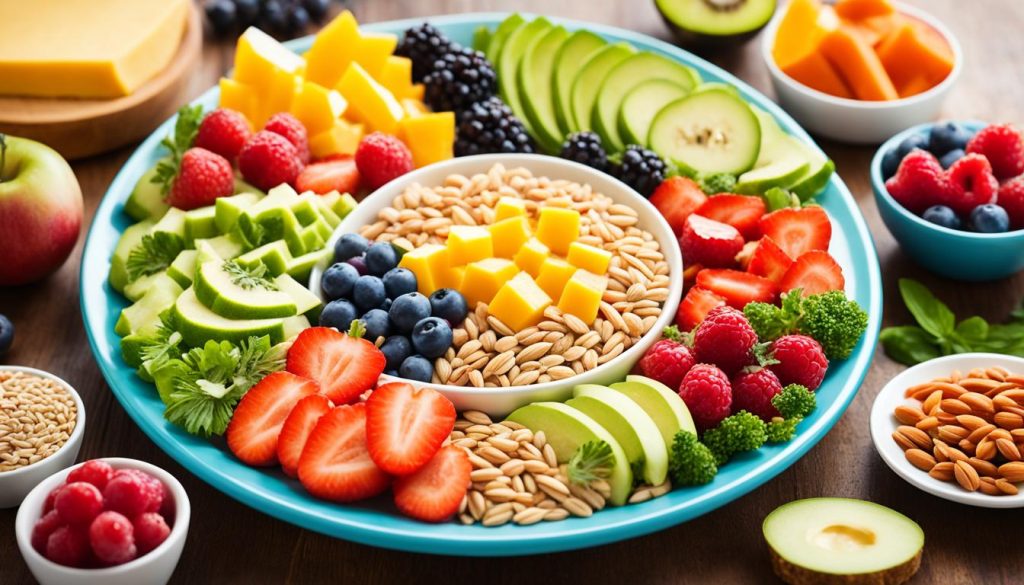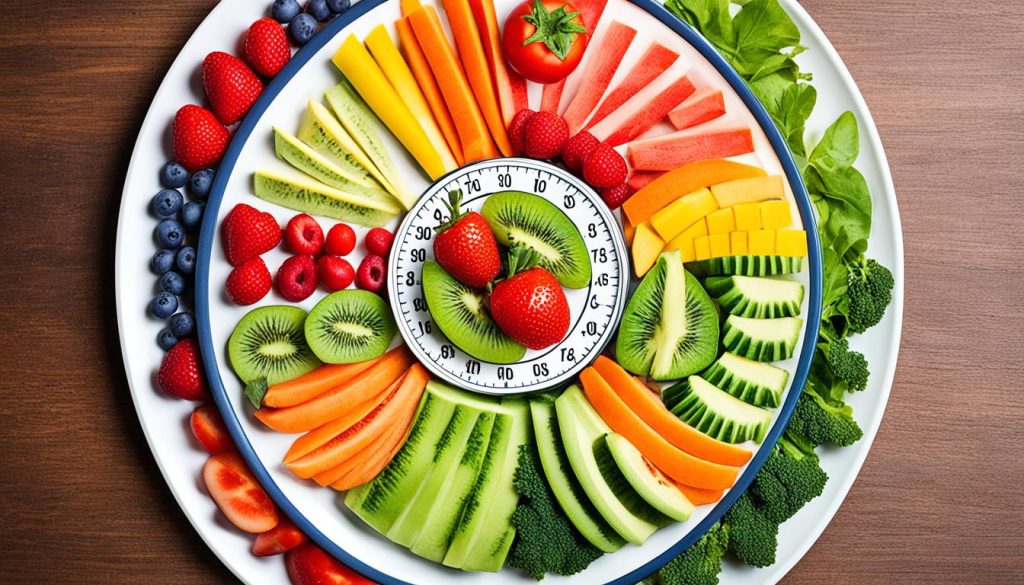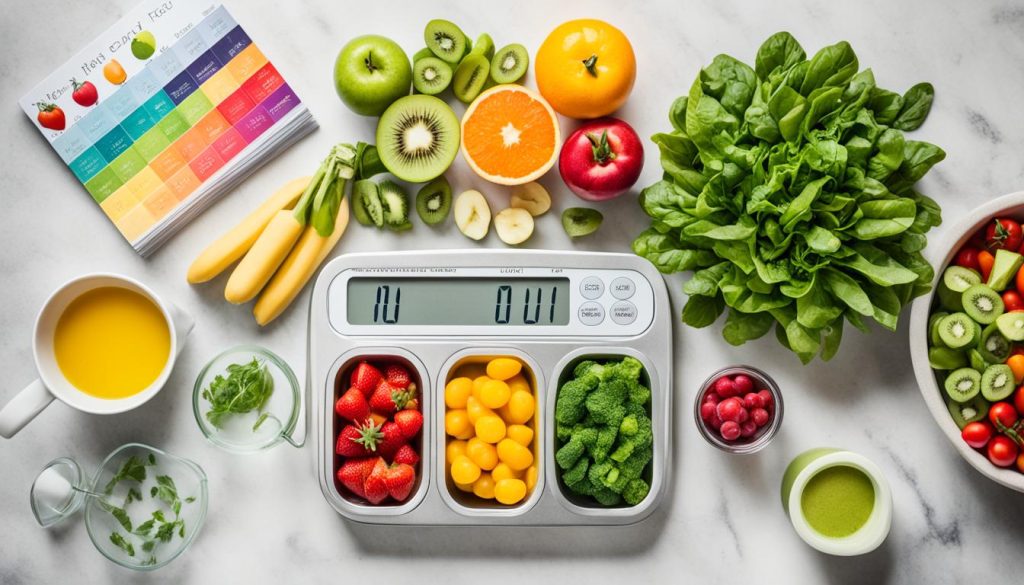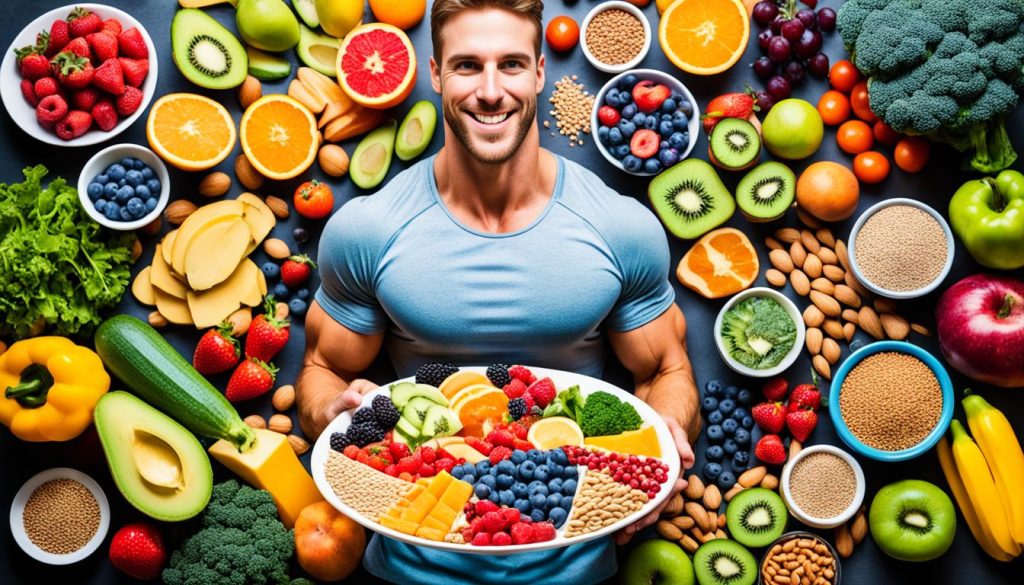Did you know nearly 80% of those who make fitness resolutions quit within six weeks? This shocking fact shows the importance of having a plan that works over time. The Ultimate Diet Plan is here to help over 28 days, changing how you eat and boosting your workouts.
This diet is all about making small changes that stick. You won’t feel like you’re giving up everything. Instead, you’ll start noting what you eat, eat breakfast every day, cut down on high-calorie drinks, stick to meal times, say no to fast food, enjoy treats in a smart way, and mix up your meals.
Following this approach helps you reach your fitness dreams. Plus, you’ll feel more energized, shed some weight, and get healthier. The Ultimate Diet Plan is all about easy but powerful steps to make your workouts and health better through food.
Key Takeaways
- Transform your diet and enhance workout performance over 28 days.
- Emphasize gradual habit formation for sustainable change.
- Record food intake and prioritize eating breakfast.
- Reduce consumption of calorie-rich drinks and fast food.
- Intelligent indulgence and meal diversity lead to better energy and health.
Introduction to Achieving Fitness Goals through Nutrition

The road to fitness achievement is greatly shaped by how we eat. A balanced fitness diet is key to reaching your goals. It merges well with your workout routine, bettering your results and helping you shed pounds.
The Importance of Nutrition in Fitness
Nutrition forms the core of a successful fitness journey. By picking up healthy food habits, you give your body what it needs to recover and refuel. Writing down what you eat can keep you on track with your diet. And, according to the National Weight Control Registry, a healthy breakfast is crucial for managing weight and boosting energy.
Link Between Diet and Workout Performance
What you eat directly affects your exercise outcomes. A diet rich in proteins, carbs, and fats can lift your gym game. Staying away from high-calorie drinks is a must to stay fit. It also helps maintain a balanced metabolism and keep energy levels up all day.
- Keep a Food Diary: Track your meals to maintain awareness of nutritional intake.
- Never Skip Breakfast: A healthy breakfast sets the tone for a productive day.
- Smart Eating Strategies: Opt for balanced meals to boost workout performance.
- Avoid Calorie-laden Beverages: Limit sugary drinks to support weight loss goals.
- Scheduled Meals: Plan regular meals to stabilize energy levels.
| Healthy Eating Strategies | Benefits |
|---|---|
| Keeping a Food Diary | Promotes accountability and consistency |
| Eating Breakfast | Improves weight management and energy levels |
| Smart Eating | Enhances workout performance |
| Avoiding Calorie-laden Beverages | Supports weight loss goals |
| Scheduled Meals | Stabilizes metabolism and energy supplies |
Understanding the Basics of a Healthy Diet
Learning the basics of a good diet is key to staying healthy. It’s about knowing what nutrition you need and adding it to your meals. This mix makes sure you get all the nutrients for good health.
Essential Food Groups
A healthy diet includes important food groups like fruits, vegetables, and more. By eating a mix of these, you get the nutrients your body needs. This helps keep you healthy.
“A healthy diet should focus on eating foods as close to their natural form as possible,” says the American Heart Association.
Swapping out high-calorie snacks for whole grains makes a big difference in your health.
- Fruits and Vegetables: Rich in vitamins, minerals, and antioxidants.
- Grains: Offers fiber and essential carbs, favoring whole grains over processed ones.
- Proteins: Essential for muscle repair and maintenance; includes beans, nuts, and lean meats.
- Dairy: Provides necessary calcium and vitamin D.

Macronutrients and Their Role
Proteins, fats, and carbs are key to a balanced diet. Each one does something special for your body:
| Macronutrient | Role |
|---|---|
| Proteins | They’re crucial for muscle health. Good sources are beans and lean meats. |
| Fats | Important for vitamin absorption and cell health. Choose healthy fats from nuts and olive oil. |
| Carbohydrates | They’re your body’s main energy source. Pick whole grains and fruits. |
Choosing nutrient-rich foods from the essential groups makes your diet better. This way, you get all the vitamins and minerals you need. It’s the key to a healthy and balanced diet.
Meal Planning for Fitness Success
For fitness success, it’s key to plan your meals. Doing so will help your diet stay balanced. It also makes sure you fuel your workouts right for the best outcomes.

How to Start Meal Planning
To begin meal planning, look at what you eat now. Check daily meals and find where to make changes. Choose if you’ll prep meals weekly or every other week. Here are some starter tips:
- Set realistic nutritional goals.
- Create a list of favorite balanced recipes.
- Purchase all necessary ingredients in advance.
- Designate a specific time for meal prep.
Creating a Balanced Meal Plan
A good meal plan should have a variety of nutrients. Include proteins, grains, fats, and lots of veggies. Here’s what a day’s meals might include:
| Meal | Components |
|---|---|
| Breakfast | Oatmeal with fresh berries and chia seeds |
| Lunch | Grilled chicken salad with mixed greens and avocado |
| Dinner | Baked salmon with quinoa and steamed broccoli |
| Snacks | Fruit slices, nuts, or yogurt |
Benefits of Meal Planning
Meal planning offers lots of perks. It helps eat better, saves time, and lowers costs. It also reduces waste and keeps calories in check. Plus, it organizes your diet, crucial for long-term fitness success and clean eating habits.
What’s more, with a balanced meal plan, you can meet special dietary needs. And, you get to taste meals from all over, spicing up your diet.
Creating Sustainable Eating Habits
Creating sustainable eating habits is about long-term health, not quick fixes. It means valuing clean eating and making small, positive changes to your diet. These steps can lead to longer-lasting health improvements. It’s all about loving your food and understanding what you like to eat.

It’s important to watch out for the negative parts of diet culture. This culture often shows us unhealthy body images and causes mental stress. Instead, choosing clean eating can bring real and lasting health gains, without the downsides of strict diets.
- Gradual Habit Formation: Make tiny changes to your diet every week, rather than big sudden ones. For example, eat more vegetables or swap sugary snacks for healthier options.
- Mindful Eating: Eat slowly and enjoy every bite. You’ll develop a better bond with food and avoid eating too much.
- Diverse Diet: Sample different foods from various cultures. This not only boosts enjoyment but also ensures a rich intake of nutrients.
Some people might need more help sticking with dietary changes. The next section explains how sustainable eating habits differ from fast diets.
| Aspect | Fad Diets | Sustainable Eating |
|---|---|---|
| Focus | Rapid weight loss | Long-term health improvement |
| Flexibility | Restrictive and rigid | Adaptable and inclusive |
| Mental Impact | High stress and anxiety | Positive and empowering |
| Diet Diversity | Monotony | Cultural and culinary variety |
Focus on forming good habits and eating cleanly for lasting health changes. The aim is to have a balanced and fun eating plan that boosts your whole health, mind and body included.
The Best Foods to Include in Your Fitness Diet
It’s vital to choose the best foods for your fitness diet. Doing so can boost your workout performance and help you reach your fitness goals. By eating a mix of protein, carbs, and healthy fats, you increase your energy and promote muscle recovery.
Protein Sources
Protein is key for a fit lifestyle. It helps your muscles recover and grow. Look for these top protein sources:
- Salmon
- Chicken breast
- Tofu
- Lentils
- Greek yogurt
These foods are not just protein-packed. They also provide other key nutrients for your health.
Carbohydrates and Energy
Carbs give you the energy you need for tough workouts. Choose energy foods that are full of complex carbs. For example:
- Quinoa
- Brown rice
- Oats
- Sweet potatoes
- Whole-grain bread
These choices help you keep your energy up during training by providing a steady energy release.
Healthy Fats
Don’t forget healthy fats for your heart and hormones. Some great options include:
- Avocados
- Olive oil
- Nuts and seeds
- Chia seeds
- Fatty fish like mackerel
These
healthy fats
help with overall health. They make your fitness plan more effective.
| Type | Recommended Foods | Benefits |
|---|---|---|
| Protein Sources | Salmon, Chicken Breast, Tofu, Lentils, Greek Yogurt | Muscle Recovery and Growth |
| Carbohydrates and Energy | Quinoa, Brown Rice, Oats, Sweet Potatoes, Whole-Grain Bread | Steady Energy Release |
| Healthy Fats | Avocados, Olive Oil, Nuts and Seeds, Chia Seeds, Fatty Fish | Heart Health and Hormone Balance |
Common Diet Plans for Fitness Goals
Finding the right diet can be hard, especially for specific fitness goals. The keto diet, paleo diet, and vegan diet have their pros and cons. Knowing these helps choose a diet that fits personal nutrition needs and life.
Keto, Paleo, and Vegan Diets
The keto diet is all about high fats, medium proteins, and low carbs. It aims to reach ketosis, making the body use fat for fuel.
The paleo diet likes what ancient humans might have eaten. This includes lean meats, fish, fruits, nuts, and veggies. It cuts out processed foods, grains, and dairy.
The vegan diet is about no animal products, focusing on plants. It prefers veggies, fruits, legumes, nuts, and seeds for a nutrient-rich and high-fiber diet.
Comparing Different Diets
When comparing these diets, think about if they are flexible, sustainable, and affect your fitness goals.
| Diet Plan | Carbohydrates | Proteins | Fats |
|---|---|---|---|
| Keto Diet | Low | Moderate | High |
| Paleo Diet | Moderate | High | Moderate |
| Vegan Diet | High | Moderate | Low |
Each diet plan has its own way to good nutrition. The keto diet for weight loss and muscle gain, the paleo diet for its impact on health, and the vegan diet for sustainability are considered.
Picking the right diet involves looking at what you want for your health and what you can stick with. It means trying different options to see what works best for you over time.
Calorie Counting and Portion Control
Knowing how to count calories and control portions can really help with your weight. It lets you eat wisely, which forms healthy eating habits. Here are some tips to help:
- Know the right serving sizes to prevent overeating. Use a scale to measure instead of guessing.
- Preportioned items aid in managing how much you eat. They stop you from eating too many calories by mistake.
- Avoid ‘flubber foods’ that seem healthy but might not be. They could mess up your diet and eating routine.
- Stay balanced in how you think about food. Enjoy your meals while keeping an eye on nutrition and how much you eat.
Pairing your calorie intake with exercise is key. It makes weight management doable without making you feel you’re missing out. Use this table for a quick look at portion sizes for common foods:
| Food Item | Serving Size | Calories |
|---|---|---|
| Chicken Breast | 3 oz | 140 |
| Brown Rice | 1 cup | 215 |
| Broccoli | 1 cup | 55 |
| Almonds | 1 oz | 160 |
| Apple | 1 medium | 95 |
Following these tips daily can really help with managing your weight and feeling well. Don’t forget, eating healthily is about balance and joy in your food choices.
Strategies to Avoid Unhealthy Eating Habits
Creating a good eating plan means knowing what might stop you from eating well. Making small changes can help you eat better and live healthier.
Recognizing and Reducing Flubber Foods
Some foods look healthy but are full of sugars and empty calories. By spotting these, you can choose better options and eat less unhealthy food.
Stay away from foods with a lot of added sugars. Choose whole foods instead. For example, pick oatmeal and fresh fruit over sugary cereals at breakfast.
Importance of Hydration
Drinking enough water helps control your appetite and stops you from snacking too much. Sometimes, feeling hungry is a sign you need to drink more. Keep a water bottle with you and drink often to stay hydrated and avoid too many snacks.
Limiting Processed Foods
Foods that are very processed don’t give you much nutrition. They can be packed with bad fats, sugars, and salt. Cutting them out of your diet slowly can make a big difference in your health.
Here’s a table to show the difference between fresh and processed foods:
| Fresh Foods | Processed Foods |
|---|---|
| Whole fruits | Fruit snacks |
| Lean meats | Bacon |
| Whole grains | White bread |
| Vegetables | Vegetable chips |
| Nuts and seeds | Sugar-coated nuts |
Start adding more fresh foods to your meals and limit processed ones. This approach, over time, helps to eat healthier in a lasting way.
Boosting Your Diet with Supplements
Improving your fitness goals goes beyond just eating well and exercising. The right dietary supplements are key. They can fill in what your diet might miss and improve your health and performance.
When to Use Supplements
Supplements are great when you need them. They help when you don’t get enough nutrients, or when you’re working out a lot. Athletes might use whey protein to help their muscles recover and grow.
Types of Supplements to Consider
There are many supplements out there for different fitness goals. Here are some you might find useful:
- Whey Protein: Great for recovering after workouts and building muscles.
- Multivitamins: They make sure you’re getting important vitamins and minerals.
- Omega-3 Fatty Acids: They’re good for your heart and can fight inflammation.
Don’t forget, supplements should add to your diet, not replace real food. Using them wisely can make your diet even better. This can help you meet your fitness goals more effectively.
Conclusion
Starting your journey towards fitness means choosing the right foods wisely. Learning from examples in this article shows how diet and nutrition boost your health and exercise.
Creating a great meal plan and choosing the right foods is key. Focus on essential nutrients and eat mindfully. Stay away from unhealthy, high-calorie foods. Drinking enough water is also crucial.
Following these diet tips empowers you to create your own effective food plan. Find ways to add variety, control portions, and use supplements wisely. Remember, it’s not about cutting foods out, but making smart and balanced choices. Begin now to steer your wellness journey with confidence!
FAQ
What is the Ultimate Diet Plan?
The Ultimate Diet Plan lasts for 28 days. It helps people meet their fitness goals with smart changes in what you eat. You will focus on improving how you eat and how you work out.
How does nutrition impact my fitness goals?
Eating the right foods is key for your body. It gives you the energy you need to work out and helps you recover afterwards. This is important for getting fit and staying healthy.
What are some simple steps to start improving my diet?
Start by writing down what you eat to see patterns. Have a healthy breakfast every day. Cut down on sugary drinks and plan when you eat. Treats are okay sometimes, but try to be smart about them to build long-term healthy habits.
Why is meal planning important for fitness success?
Planning your meals keeps your diet on track. It saves you time and money, and helps with portion control. It’s a key part of reaching your fitness goals by keeping your diet in line.
What foods should I include in my fitness diet?
Include plenty of lean proteins, whole grains, and good fats. Add a variety of colorful vegetables for important nutrients. This mix will give your body all it needs to stay healthy and strong.
How do popular diets like Keto, Paleo, and Vegan compare?
Popular diets like Keto, Paleo, and Vegan focus on different kinds of foods. Keto is high-fat, Paleo is about whole foods, and Vegan is plant-based. Choose a diet that fits your needs and goals, and make sure it’s balanced.
What is the role of calorie counting and portion control in a fitness diet?
Calorie counting and watching your portions are vital for managing your weight. They help you eat just what your body needs. This way, you stay healthy and energized.
How can I avoid unhealthy eating habits?
Stay away from foods that are not good for you. Drink plenty of water to not eat too much. Try to eat less of food that is very processed. Small, positive changes are better than big, sudden ones for a healthier life.
Are dietary supplements necessary for a fitness diet?
Supplements can help when you lack certain nutrients or exercise a lot. But they should not take the place of real, healthy food. Popular supplements include whey protein, vitamins, and some kinds of fats.


